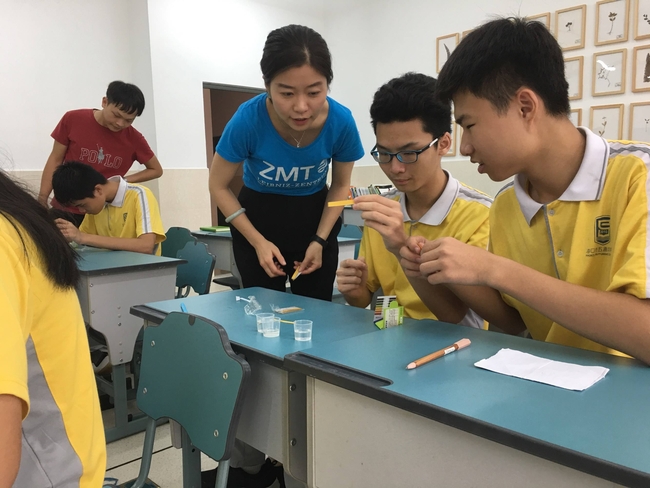02/07/2019 | Knowledge exchange activities continued on Hainan Island (China) as ZMT together with local partners organised a series of public events to celebrate World Oceans Day, which aims to raise awareness of the role of the oceans and the importance of conserving and protecting our marine environment. This year’s for World Ocean Day was “Gender and Oceans” and focused on exploring the gender dimension of human beings’ relations with the ocean and on finding ways to promote gender equality in activities related to oceans.
The different activities over the course of June and July took place in the framework of ZMT’s Sino-German collaboration project TICAS (Tackling Environmental Change Issues of China’s Coastal Aquatic Systems), led by Dr. Tim Jennerjahn, and jointly funded by the German Federal Ministry of Education and Research (BMBF) and the Chinese State Oceanic Administration (SOA).
Dr. Jialin Zhang from ZMT gave a talk on seagrass research and conservation during a public event to celebrate World Ocean Day
All images taken by Chunxia Jiang from Hainan University.
Together with the Hainan Squirrel School, an environmental education organisation, ZMT knowledge exchange expert Dr. Jialin Zhang started an awareness campaign to educate students about the ocean. Two interactive marine experiments were designed for 40 secondary students to illustrate ocean density and pH value. Afterwards, ten students selected from the campaign were invited to visit a local marine research station. “By bringing marine experiments into the classroom, we hope to help students learn more about marine features and develop a love of the ocean,” says Dr. Zhang, who was also interviewed by a local TV news station to spread the word on ZMT's activities.
Organised jointly with ZMT’s local research partner, the Hainan Ocean and Fishery Research Institute, Dr. Zhang held a half-day workshop on aquaculture wastewater treatment technologies which was attended by 70 local aquaculture farmers.
Aquaculture is the fastest growing food sector worldwide over the past four decades and China is by far the largest producer of aquaculture goods in the world. ZMT’s Sino-German research project ECOLOC (Environmental Change Affecting COastal Ecosystems of Tropical China during the Anthropocene) found that aquaculture effluent discharges strongly impair the quality of Hainan coastal waters.
The purpose of the workshop was to increase awareness among local fishermen on the impact of untreated aquaculture wastewater on surrounding ecosystems. Feasible treatment systems that are economically viable to build and operate and maintain were also introduced to reduce or eliminate the environmental impacts of pond based aquaculture production systems.
These events on Hainan aim at increasing public awareness of the values of intact coastal ecosystems and thus creating an interface between science and society by initiating a stakeholder dialogue. It facilitates the transfer of newly obtained knowledge of the ECOLOC project to stakeholders and requests their feedback in order to identify environmental problems and further research needs.

























